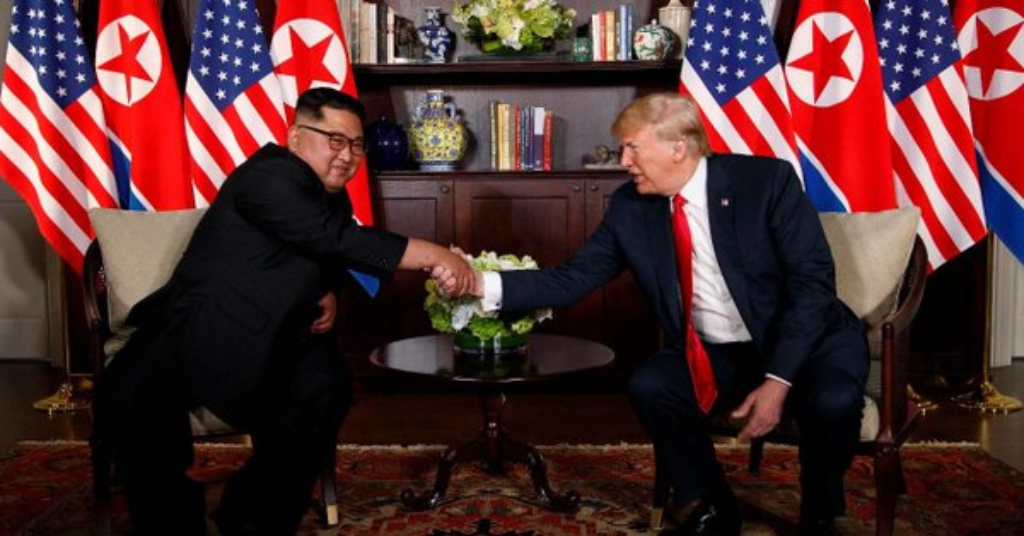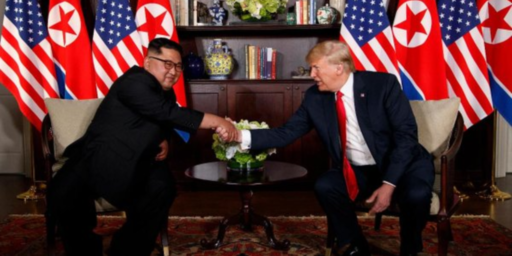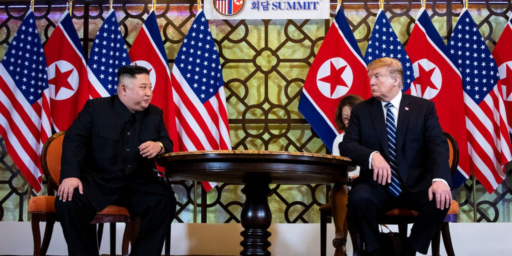Two Months After Singapore, Few Signs Of Progress With North Korea
Two months after the Singapore Summit, there's no sign that anything substantive has been accomplished on the Korean Peninsula.

It was just two months ago that President Trump and North Korean leader Kim Jong Un met in Singapore for a much-hyped summit meeting that, while historic, proved to be far less than meets the eye. While Trump walked away from the summit claiming that he and Kim had made significant progress and that North Korea was no longer a nuclear threat to the United States, the reality of what has actually occurred is harder to discern. On the positive side, the two nations are continuing to confer with each other, with Secretary of State Mike Pompeo acting as the chief American point of contact and Kim Yong Chol, a General who serves as the Vice Chairman of the DPRK’s Communist Party, acting as the chief North Korean diplomat, although the North Koreans have complained about what they call a “gangster-like” attitude among Americans. Nonetheless, as Winston Churchill put it, “[t]o jaw-jaw is always better than to war-war” so I suppose the fact that we’re continuing to talk is a good thing. Additionally, as agreed at the meeting in Singapore, the North Koreans have turned over the suspected remains of more than 100 American and other soldiers who were killed during the Korean War and there have already been some successful identifications made.
All that being said, it has become apparent over the past two months that there was very little if any substantive progress made at the summit and that the parties remain as far apart as they were when this process started. Primarily, of course, the reason for this seeming lack of progress appears to be the fact that there really wasn’t an agreement made in Singapore that amounts to anything substantive. The statement that was released at the end of the meeting was generalized and non-specific, and completely glossed over such fundamental issues as the fact that the United States and North Korea do not mean the same thing when they use the term “denuclearization.” Because of that, the current round of talks, which the United States insists are ultimately aimed at North Korea turning over its nuclear weapons, doesn’t seem to be going anywhere notwithstanding the fact
On top of this lack of progress in the talks, actions by the DPRK make it clear that, at least as far as they’re concerned, there was no agreement made in Singapore to get rid of what they clearly seem to believe is a credible nuclear deterrent. Less than two weeks after the summit, for example, it was reported that North Korea was increasing production of the fuel needed to make additional nuclear weapons and that it was concealing the existence of ongoing nuclear weapons research at secret facilities well hidden from both surveillance and, most likely, the ability of the United States to take the sites out in a military strike. Additionally, it became apparent in the days after the summit that the much-publicized destruction of the DPRK’s primary nuclear weapons test site, an event it was witnesses by American and other international journalists at the invitation of the Pyongyang government was much less than met the eye and that the site could easily be rebuilt if needed in the future. This week, we learned that the DPRK had also begun work on the construction of new ballistic missiles at yet another secret site. As we sit here nearly two months since the summit, then, it is obvious that the reality of what had been accomplished at the summit did not meet the rhetoric. These are not the actions that one would expect from a nation that had agreed to “denuclearization” in the sense of giving up their existing nuclear weapons program. Additionally, analysts who have seen satellite images say that the DPRK has made a second large nuclear reactor operational. This type of reactor is capable of making plutonium which is, of course, one of the main fuels used in the production of nuclear weapons. This new reactor can reportedly make four times as much plutonium as North Korea’s current reactor, which has been the source for the plutonium needed for its nuclear arsenal to date. The biggest takeaway from the time that has passed since the summit, then, is that North Korea never actually agreed to any of the promises the Administration is now claiming it is failing to live up to. Despite all of this, the Trump Administration continues to claim, falsely, that the North Koreans are not living up to the commitments they made in Singapore.
As a result of all this, the United States and North Korea find themselves in something of a standoff:
WASHINGTON — North Korea is insisting that the United States declare that the Korean War is over before providing a detailed, written disclosure of all its atomic weapons stockpiles, its nuclear production facilities and its missiles as a first major step toward denuclearization.
Two months after President Trump declared his summit meeting in Singapore with Kim Jong-un a complete success, North Korea has not yet even agreed to provide that list during private exchanges with Secretary of State Mike Pompeo, according to American and South Korean officials familiar with the talks.
Mr. Pompeo maintains progress is being made, although he has provided no details. But John R. Bolton, Mr. Trump’s national security adviser, this week said, “North Korea that has not taken the steps we feel are necessary to denuclearize.”
On Thursday, North Korea’s state-run newspaper, Rodong Sinmun, called the declaration of the end of the war “the demand of our time” and that would be the “first process” in moving toward a fulfillment of the June 12 deal struck between Mr. Trump and Mr. Kim. Pyonygang also wants peace treaty talks to begin before detailing its arsenal.
If the standoff over the parallel declarations remains, it is hard to see how the two countries can move forward with an agreement.
“The North Koreans have lied to us consistently for nearly 30 years,” Joseph Nye, who wrote one of the National Intelligence Council’s first assessments of the North’s weapons programs in 1993, said at the Aspen Institute on Tuesday.
“Trump is in a long tradition of American presidents who have been taken to the cleaners,” Mr. Nye said.
Neither Mr. Trump nor Mr. Pompeo has acknowledged the impasse. But officials said South Korea has quietly backed the North Korean position, betting that once Mr. Trump has issued a “peace declaration” it would be harder for him to later threaten military action if the North fails to disarm or discard its nuclear arsenal.
Against North Korea’s continuing nuclear buildup — and its threats to strike the United States — Washington has long refused to formally declare the end of the war, which was halted with a 1953 armistice but never officially brought to a close.
And fears remain that making concessions to Pyongyang — especially after Mr. Trump shelved annual American military exercises with South Korea that he called “war games,” the phrase used by the North — would outrage Republicans in Congress and open Mr. Trump to charges that he has been outmaneuvered by the North Korean leader.
The White House has never reconciled Mr. Trump’s post on Twitter after meeting Mr. Kim that “there is no longer a Nuclear Threat from North Korea” with Mr. Bolton’s assessment that the Singapore agreement has so far yielded almost no progress in the nuclear arena. That view is shared by many in Congress and the American intelligence agencies.
For Mr. Trump and Mr. Pompeo, much rides on how this standoff is resolved — or whether it results in the collapse of what the president called his determination to “solve” the nuclear crisis.
As I have said before, there are things that could be accomplished if both the United States and North Korea approached these negotiations realistically. Tensions on the Korean peninsula, which have been on a razor’s edge since the end of the Korean War and ramped up significantly last year during the tit-for-tat exchanges that took place between President Trump and the North Korean leader, have calmed down significantly this year and making that more permanent would be a good thing. Additionally, more formal negotiations aimed at bringing the Korean War to a formal end should be pursued, as should agreements designed to ease the conventional arms standoff across the Demilitarized Zone. However, as I have noted before (see here and here), if the United States continues to insist that the ultimate goal of these talks is the idea that North Korea will give up its nuclear arsenal, then these talks are doomed to fail.




In other news, water continues to be wet.
It’s absurd to say that no progress has been made . . . Oh, you mean progress for us. No, no progress for us. Plenty of progress for Kim.
Based on the Trump fiasco in Korea, I think the Iranians should immediately suggest one-on-one talks with Trump. He’d end up giving them Israel.
I wonder how many of Mangolini’s die-hard supporters believe North Korea has given up all its nukes already.
@Kathy: Probably the same number who believe he’s already built a wall on the Mexican border and that they’re signed up to an excellent program called TrumpCare. Which is to say, the majority.
@Kathy: @ tKylopod:
Trumpkins, like Trump, live totally in the moment. They neither remember nor care that he promised to “repeal and replace Obamacare on day one,” to build the wall and make Mexico pay for it, to denuclearize North Korea…
Trump is the “blue collar billionaire business man” who “owns the libturds.” That’s all that counts.
“… betting that once Mr. Trump has issued a “peace declaration” it would be harder for him to later threaten military action if the North fails to disarm or discard its nuclear arsenal.”
If only President Moon had asked me the last time I was in Korea, I could have told him that wasn’t a safe bet.
(For clarity’s sake, no, I did not meet w/President Moon.)
@Michael Reynolds:
Somebody had a cartoon showing a TV with Trump saying his all caps “…YOU WILL SUFFER CONSEQUENCES THE LIKES OF WHICH FEW THROUGHOUT HISTORY HAVE EVER SUFFERED BEFORE. …” tweet. In front of the TV a guy with a turban and bushy white beard is shouting to his buddies, “We’re gonna get a summit!”